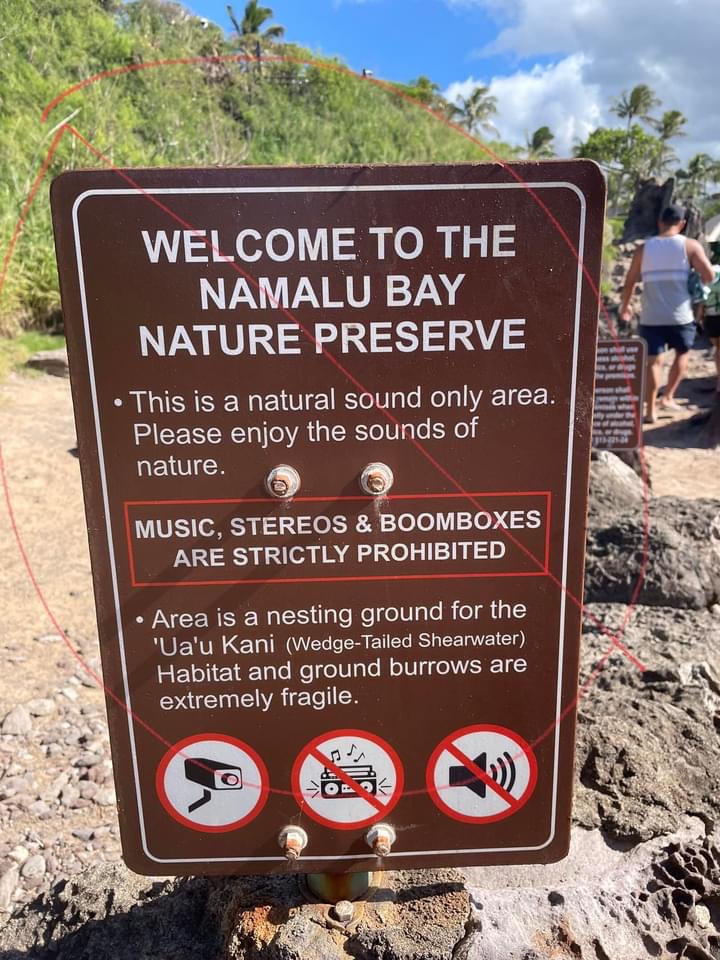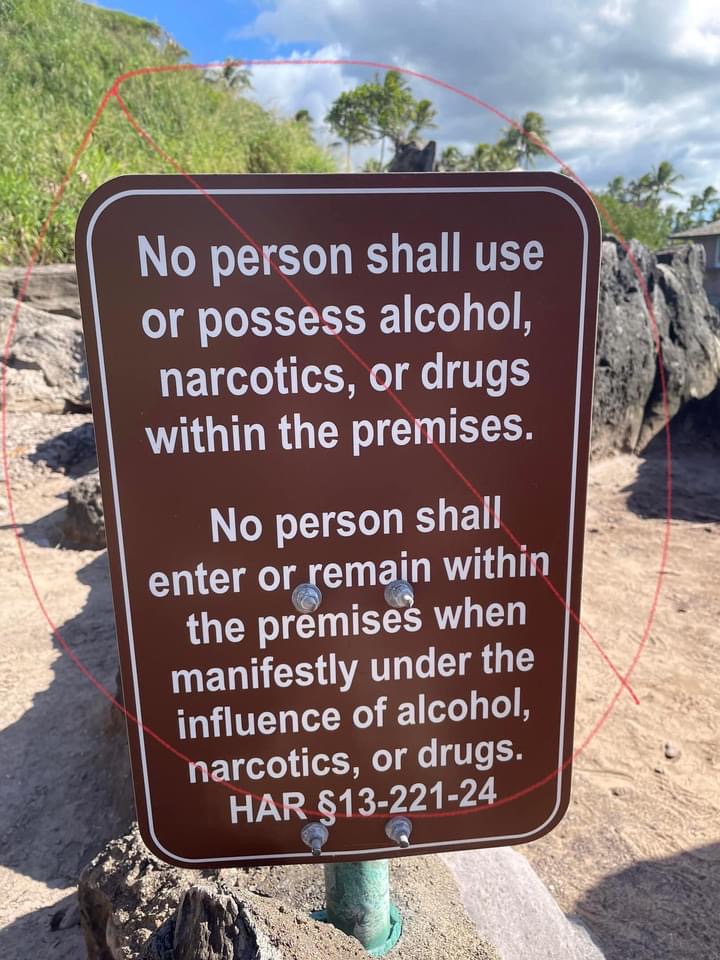Kapalua mansion owner claims to fight ‘noise pollution’ in Cliff House controversy
Questions over shoreline access and public versus private jurisdiction have bubbled to the surface in a controversy that pits a wealthy blockchain entrepreneur against many who frequent the popular Cliff House swimming spot in Kapalua.
Maui shoreline activist Kai Nishiki via social media Wednesday alerted residents that neighboring mansion-owner Jonathan Yantis allegedly cut down the Cliff House ladder, erected misleading nature preserve signs about native birds, and hired a private security officer to “harass” people about noise, drinking, and music.
Now, many residents are saying they will head out to Cliff House this weekend to stake their claim to public access.
“Yes, I’m encouraging people to go out and exercise your rights to access the shoreline in a safe way, a responsible way. And be sure to clean up your trash,” Nishiki said Thursday. “Have fun; be safe. Exercise your rights.”
Yantis, though, countered the claims Wednesday evening, saying that Nishiki is painting him in a poor light and that he’s never blocked or discouraged access to Cliff House. Instead, he wants to combat “noise pollution” and underage drinking.
“All I really want is just to stop the massive noise pollution,” he told Maui Now via phone. “I guess it’s OK — but if it was in front of your house, what would you do?”
“It’s open — it’s never been closed. No one is restricting anything. No one ever has. There are all these people saying to come this weekend, well please do,” he added.
State Department of Land and Natural Resources on Thursday night said it is aware of concerns raised by the community through the news and social media and will investigate to determine if any conservation district use violations by area private property owners have occurred. It also asked the public to follow rules that govern unencumbered land.
Cliff House fronts high-end resort Montage Kapalua Bay on Hawea Point, a stunning peninsula overlooking Namalu Bay. Public access and native seabird ʻuaʻu kani protection are set in perpetuity thanks to a conservation easement solidified by a previous landowner, according to Hawai’i Land Trust and Maui Nui Seabird Recovery Project.
However, DLNR said the area consists of private property, unencumbered lands regulated by DLNR as well as a conservation easement used to protect seabirds. It did not refer to public access protected by the conservation easement.
Managed by Hawai’i Land Trust, the easement overlays Yantis’ property line, which reaches to the high water mark. The easement that provides public access includes the pathway from the parking lot and covers the cliffside where people jump and sunbathe.
Whether the public has the right to the pill box overlooking the cliffs is still in question and officials are looking into the rules governing the easement and unencumbered land.
Typically the shoreline is managed by the county (onshore), the state (seaward of shoreline or high-water mark) and the federal government (into the water). Cliffside with a pill box in the center is harder to discern.
Battles over beach access between residents and wealthy hotel and landowner giants have become a flashpoint exacerbated by the pandemic. Maui County has been buckling under the weight of record-high home prices, historic low housing inventory and higher out-of-state resident home purchases than in previous years. Resident out-migration has been increasing since coronavirus. And the Aloha State that was initially shut down to most visitors reopened to a faster-than-expected resurgence in domestic travelers despite several subsequent waves of COVID-19.
Late last year, Amazon founder Jeff Bezos bought a 14-acre La Perouse estate for $78 million. Since then, surfers have talked about whether he will impact the popular surf site and public access trails.
Hailed as one of the pioneers of virtual currency, Yantis purchased the 9 Bay Drive, Kapalua, 6,645 square-foot mansion on about 7.66 acres in 2020 for $24 million, according to county records. It was listed in 2019 for $37.5 million and he’s now selling it for $59.5 million, real estate listings said.
Typically beyond a private property owner’s jurisdiction, a pool-looking ladder was cemented into a partially submerged rock for many years that provided easier access in and out of the ocean. Residents on social media decried the ladder’s removal.
But Yantis said the ladder was cut about a year ago because “it was a liability.” He also said it didn’t have a permit and he was trying to obtain a county Special Management Area permit for other home work, so it was removed.
He vacillated from saying he doesn’t want to create drama and will return the ladder, to saying the ladder “is not needed” and “shouldn’t be there.”
“You want the ladder? You can have the ladder. The ladder is not needed. It doesn’t have a permit. It shouldn’t be there. People can bring their own ladders,” Yantis said. “Not having the ladder is not going to deter people from coming.”
He added that there are beautiful ladders built into the rock.
Yantis more recently erected signs that refer to “Namalu Bay Nature Preserve” and ask people to enjoy the sounds of nature. It also notifies people about nearby ʻuaʻu kani habitat. “Music, stereos and boomboxes are strictly prohibited,” according to the signs.
DLNR said any land uses in the conservation district, such as signs, kiosks and guard shacks, would have required a permit per Hawaiʻi law. DLNRʻs Office of Conservation and Coastal Lands does not have record of pending or approved permits.
County Planning Director Michele McLean said Thursday that Yantis does not show any pending or approved Special Management Area permits for the signs he erected.
Further, Jay Penniman, Maui Nui Seabird Project manager, on Thursday said he’s never heard of “Namalu Bay Nature Preserve” and that loud noises do not impact the birds, which nest closer to the mansion and the foliage areas. Other than when people bring dogs, whose scent is even bad for the birds, the public access has not been an issue. In fact, ʻuaʻu kani have increased there over the last two decades due to conservation work.
Penniman said that he’s been advocating for the state to purchase part of Hawea Point for conservation, and now that the mansion is up for sale, this could be a good time to convert it to a state-owned nature center.
When it comes to the pill box, Yantis said he’s employed a security guard about eight or nine months to sit daily atop the platform, which is a highly-coveted spot that was historically first-come, first served.
Yantis said many underage drinkers gather around Cliff House, and the security guard and signs help protect against illegal drinking. Although not an enforcer, he said, the guard requests that people lower music, even if they refuse. The area is cleaner, safer and less raucous with the employee, he said.
“A lot of people are appreciative,” Yantis said.
Perhaps Yantis’ biggest concern is what he calls “unenforced noise pollution,” which he said is amplified music, not necessarily someone yelling or a kid crying. Yantis cited Hawaiʻi law that requires noise be below 55 decibels in this particular zoning and at several points referenced the use of “boomboxes.” The Centers for Disease Control and Prevention said 60 decibels has the average sound level of a conversation or an air conditioner.
When asked why he continues to push back when he is moving, Yantis said he has drawn a line in the sand.
“Sometimes you just have to stand up for yourself,” he said. “Noise pollution — that’s my only issue. I’ve complained about the boats, the planes — noise pollution is a real problem. You have to keep accepting it but you don’t have to accept it. Until I sell the place, that’s my little thing that I’m pushing toward.”
He said he’s disappointed with the “hatchet piece” that’s on social media and doesn’t want conflict with the community. Yantis said he has Hawaiʻi ties, including attending Hilo High School for four years.
“I’m going to stay on island,” he said. “I’m going to find a place that isn’t as loud. I asked Kai just wait two months. I’m going to move.”
DLNR in a media statement Thursday night said that while state unencumbered lands are generally open to the public, certain rules prohibit the following:
- The use any of audio devices including, but not limited to radios, tape recorders, television sets, musical instruments, compact disc players and noise producing devices, such as electric generating plants or other equipment driven by motors or engines, in a manner and at times which creates excessive noise (HAR 13-221-13 (a)).
- Disorderly conduct as defined in the State Penal Code (HAR 13-221-16).
- The use of alcohol while on the premises (HAR 13-221-24).
Violations unencumbered land rules carry administrative penalties that can result in high fines, it added.
“DLNR is aware of social media postings encouraging the public to rally at Hawea Point,” the statement said. “We would like to remind everyone to respect private property in the area.”
* This story has been updated from its original version to include comment from DLNR.












_1768613517521.webp)







